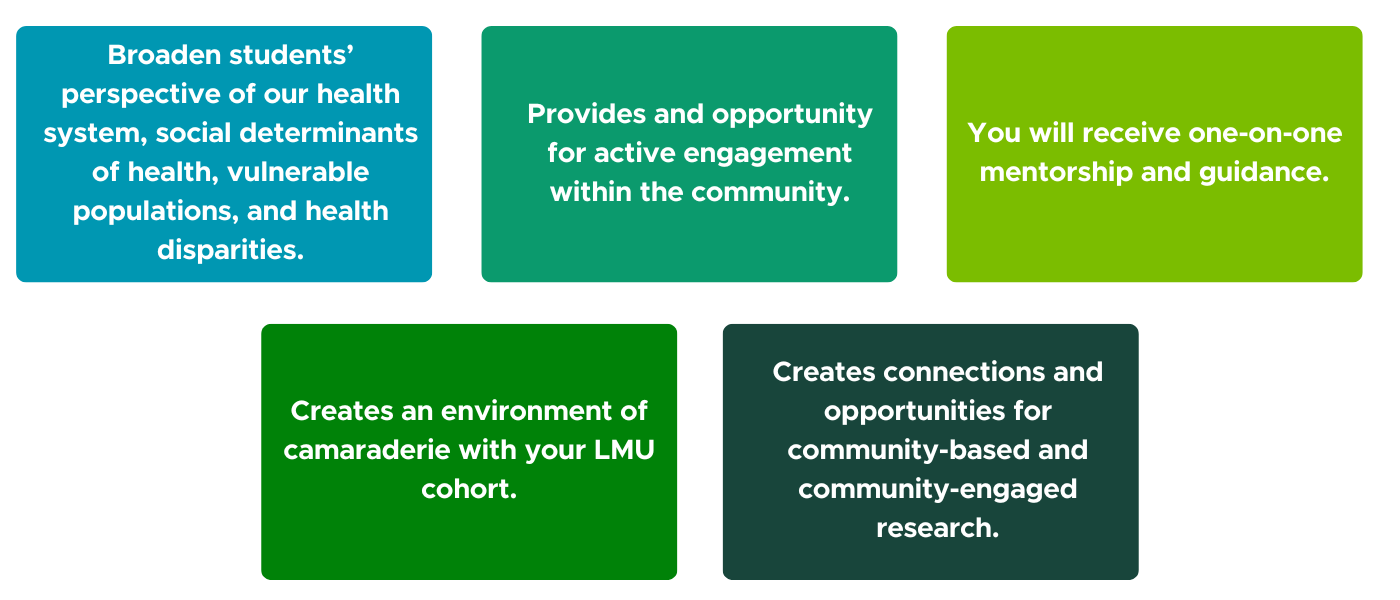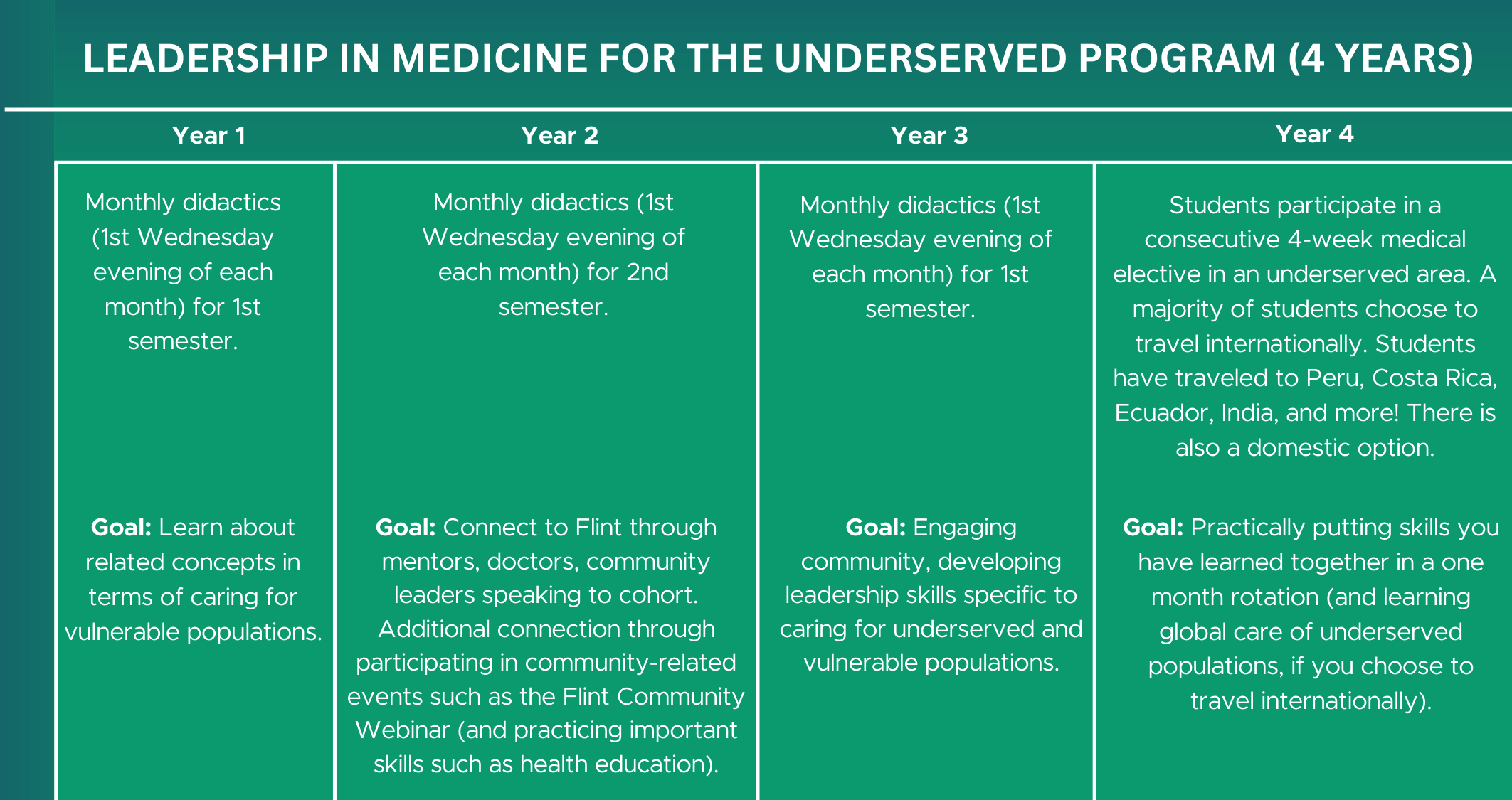Frequently Asked Questions
Admissions specific FAQ
-
How do students apply to LMU and what is the process?
You will apply to the MSU College of Human Medicine through AMCAS and then you can apply to LMU specifically through this system. There are additional short-essay responses specifically for the LMU application. Below maps out the process of applying to LMU.

Full alt text for above image.
Infographic detailing the application process. Once students are accepted to the College of Human Medicine and have applied to the LMU program, their application is sent to LMU for review. The LMU team makes a decision to interview a candidate (or not interview). If a student is selected for an interview, they will complete the interview process. A decision (accepted, waitlisted, or rejected) will be rendered within 2-4 weeks by the LMU team. -
Can students apply to LMU once they start at MSU College of Human Medicine??
Students can apply to LMU once they start at MSU College of Humna Medicine; however, we often have students on our waitlist from initial applications. We recommend you apply for LMU with your medical school application to be considered for a spot once you start at the college.
-
Will applying to the LMU program impact my chances of regular admission, if I don’t get into the LMU program?
No, you must be accepted to the college before being considered for the LMU program (not the other way around).
-
I have already submitted my initial and secondary application for MSU College of Human Medicine. Can I still apply for LMU?
Yes, you can. Please reach out to admissions to alert them that you would like to apply for LMU.
-
Do applicants need to come from an underserved background?
No, applicants do not need to come from an underserved background but do need to have an interest in working with underserved populations. Applications will not consider protected characteristics.
-
Do I need to have proficiency in a second language to apply to LMU?
No, you do not need to come into medical school with proficiency in a second language. You do need acquire conversational (low-intermediate) proficiency of a (any) second language by the time you reach 3rd year. We support you in this through various ways, including language electives that are offered by the college and through the medical library via language-learning applications.
Program specific Questions
-
What makes LMU unique?

Full alt text for above image.
Infographic detailing reasons that makes the LMU program unique, including:- Broadens students' perspective of our health system, social determinants of health, vulnerable populations, and health disparities.
- Provides an opportunity for active engagement within the community
- You will receive one-on-one mentorship and guidance
- Creates an environment of camaraderie with your LMU cohort
- Creates connections and opportunities for community-based and community-engaged research
-
What is the layout of the LMU program, over the 4 years of medical school?
LMU consists of:

Full alt text for above image.
Infographic detailing the LMU program layout, including:- Year 1: Monthly didactics (1st Wednesday of each month) for 1st semester with a goal of learning about related concepts in terms of caring for vulnerable populations.
- Year 2: Monthly didactics (1st Wednesday of each month) for 2nd semester with a goal of connecting to Flint through mentors, doctors, community leaders speaking to the cohort. Additional connection through participating in community-related events such as the Flint Community Webinar (and practicing important skills such as health education).
- Year 3: Experiential learning through community-based electives. You will be paired with a community organization for 2 weeks in the Fall and 2 weeks in the Spring. The goal is engaging community, developing leadership skills specific to caring for underserved and vulnerable populations.
- Year 4: students participate in a consecutive 4-week medical elective in an underserved area. A majority of students choose to travel internationally. Students have traveled to Peru, Costa Rica, Ecuador, India, and more! There is also a domestic option. The goal is to practice skills the student has learned in a one month rotation (and learn about global care of underserved populations if they travel internationally).
-
Where are LMU students located in preclinical and clinical years?
All students in the LMU program come to Flint for their clinical (3rd and 4th) years. A spot in LMU guarantees you will be in Flint for the community campus selection, avoiding the uncertainty of location for 3rd and 4th year. A minority of students in East Lansing and Grand Rapids will remain in those locations after their first 2 years, with the majority leaving for the many other community campuses the college has to offer.

Full alt text for above image that shows the 1st and 2nd year of medical school is at the East Lansing or Grand Rapids campus and the 3rd and 4th year of medical school is at the Flint campus. -
What is the process for selecting a community partner site?

Full alt text for above image.
Infographic detailing the process for selecting a community partner site.- September of 3rd year: meet one-on-one with LMU team
- Early October: Sent survey to rank top 3 choices for community site
- Late October: Selections are made (most students get top choice)
- November: Community electives takes place
-
Do all LMU students do international rotations?
The majority of LMU students will complete a 4th year global elective (as their LMU elective requirement); however, some students complete this requirement domestically.

